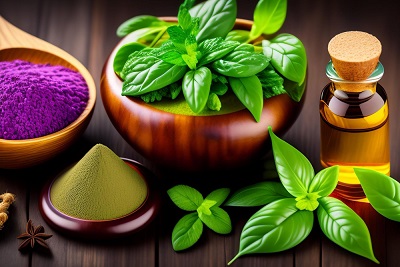
हमारे चिकित्सा केंद्र में पंचकर्म का उपयोग उपचार की प्राकृतिक चिकित्सा पद्धति के रूप में किया जाता है। यह विषहरण और कायाकल्प उपचारों की एक व्यापक और पारंपरिक प्रणाली है जिसकी उत्पत्ति प्राचीन भारत में चिकित्सा की एक सम्पूर्ण प्रणाली आयुर्वेद के एक भाग के रूप में हुई थी। शब्द "पंचकर्म" का संस्कृत में अनुवाद "पांच क्रियाएं" है, जो पांच प्राथमिक चिकित्सीय प्रक्रियाओं या उपचारों का संदर्भ देता है जो इस सफाई और उपचार प्रक्रिया को बनाते हैं। इन उपचारों का उद्देश्य विषाक्त पदार्थों को खत्म करके शरीर, दिमाग और आत्मा को संतुलित करना, सद्भाव बहाल करना और समग्र कल्याण को बढ़ावा देना है। पंचकर्म में शामिल हैं:
यह एक चिकित्सीय उल्टी प्रक्रिया है जो ऊपरी श्वसन पथ और पेट से अतिरिक्त बलगम और विषाक्त पदार्थों को निकालने में मदद करती है। वमन का प्रमुख उद्देश्य होता है विषैले तत्वों को शरीर से बाहर निकालना है, जिससे विभिन्न रोगों और आम रोगों का इलाज किया जा सके। इस प्रक्रिया के द्वारा शरीर को उसकी स्वस्थ स्थिति में लौटाने का प्रयास किया जाता है।
विरेचना आयुर्वेद में एक चिकित्सा प्रक्रिया है। यह एक पंचकर्म का हिस्सा है, जो शरीर में दोषों (बायोएनर्जी) का संतुलन स्थापित करने के लिए शोधन और शुद्धिकरण चिकित्साओं का एक सेट होता है। विरेचना विशेष रूप से शरीर से अतिरिक्त पित्त दोष (तीनों दोषों में से एक) को हटाने के लिए है। विरेचना के दौरान, व्यक्ति को शुद्धिकरण करने वाली विशेष जड़ी बूटियों या दवाओं को दी जाती है, जो मल को बाहर करने के लिए प्रेरित करती हैं। यह शरीर में विषैले पदार्थ, अतिसार, और अतिरिक्त पित्त को गैस्ट्रोइंटेस्टाइनल ट्रैक्ट और अन्य संबंधित अंगों से हटाने में मदद करता है।
बस्ती, जिसे अंग्रेजी में "enema" कहा जाता है, एक प्रकार की आयुर्वेदिक चिकित्सा प्रक्रिया है जिसमें शरीर में और अधिकतम पाचक त्राव अंतःकोशिकाओं में संदर्भ तक प्रवेश कराया जाता है। यह उपचार तकनीक शुद्ध और ऊर्ध्व-गमन शक्तियों को संतुलित करने, मल-निकासी करने, अंतःकोशिका संदर्भ को बढ़ावा देने, और शरीर के अन्य दोषों को शुद्ध करने के लिए किया जाता है।
नस्य कर्म एक प्रकार की आयुर्वेदिक चिकित्सा प्रक्रिया है जो नासिका (नाक) के माध्यम से दिए जाने वाले औषधिक प्रवाह को समझाता है। नस्य कर्म के माध्यम से विभिन्न रोगों और लक्षणों का उपचार किया जाता है। यह रोगों को नासिका मार्ग से इलाज करने का एक प्रभावी तरीका होता है।
रक्तमोक्षण एक प्राचीन आयुर्वेदिक चिकित्सा प्रक्रिया है जिसमें शरीर से रक्त को हटाया जाता है। यह विशेष रूप से उच्च रक्तचाप, रक्त दोष, रक्तसंबंधी रोगों, जैविक रूप से रक्त बंधन, और रक्त की स्थानीय संदेहात्मक समस्याओं के उपचार के लिए किया जाता है।
ये पंचकर्म शरीर के विभिन्न अवस्थाओं और रोगों के उपचार में प्रयोग किए जाते हैं। पंचकर्म चिकित्सा विधि शारीरिक और मानसिक स्वास्थ्य को संतुलित और सुदृढ़ बनाने के लिए माना जाता है।
संपूर्ण पंचकर्म प्रक्रिया आम तौर पर एक प्रारंभिक चरण (पूर्वकर्म) से शुरू होती है, जिसमें मुख्य उपचारों के लिए शरीर को तैयार करने के लिए आहार समायोजन, हर्बल उपचार और मालिश शामिल होती है। मुख्य उपचारों के बाद, शरीर को धीरे-धीरे सामान्य स्थिति में लौटने में मदद करने के लिए उपचार के बाद का चरण (पाश्चत्कर्म) होता है।
पंचकर्म न केवल एक शारीरिक विषहरण प्रक्रिया है, बल्कि एक समग्र उपचार का दृष्टिकोण भी है जो मानसिक, भावनात्मक और आध्यात्मिक कल्याण पर गहरा प्रभाव डाल सकता है। यह अक्सर उन व्यक्तियों द्वारा खोजा जाता है जो अपने शरीर को फिर से जीवंत करने, पुरानी स्वास्थ्य समस्याओं को कम करने और संतुलन और जीवन शक्ति को बहाल करने के लिए एक प्राकृतिक और व्यापक तरीके की तलाश में हैं। हालाँकि, हमारे योग्य आयुर्वेदिक चिकित्सक के मार्गदर्शन में पंचकर्म करना आवश्यक है जो आपकी विशिष्ट आवश्यकताओं के अनुसार उपचार कर सकते हैं और आपकी प्रगति की बारीकी से निगरानी कर सकते हैं।
इसके अन्तर्गत तनाव, चिंता और भावनात्मक असंतुलन को दूर करने के लिए ध्यान, योग और विश्राम तकनीक जैसे अभ्यास को किया जाता है।
मस्कुलोस्केलेटल संरेखण और समग्र कल्याण में सुधार के लिए मालिश (अभ्यंगम, काइरोप्रैक्टिक समायोजन, पंचकर्म, शिरोधारा, जानू वस्ति, कटिवस्ती, भाप स्नान और बॉडीवर्क के अन्य रूप) जैसी तकनिकी का इस्तेमाल इसके अंतर्गत किया जाता है।